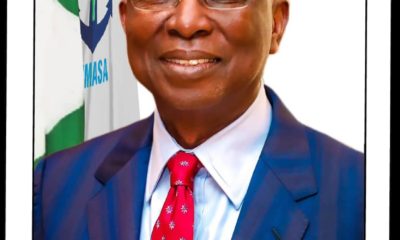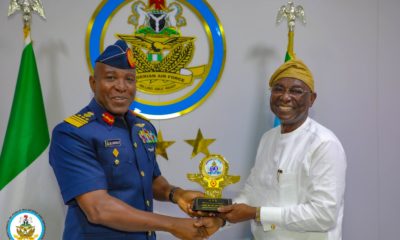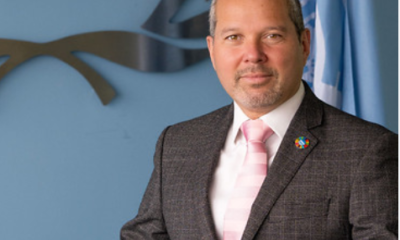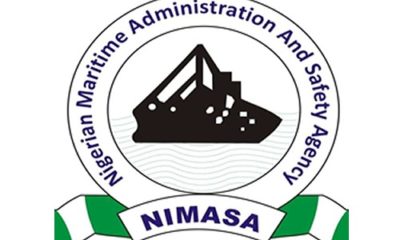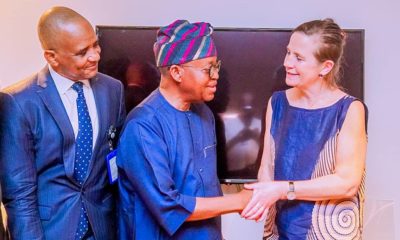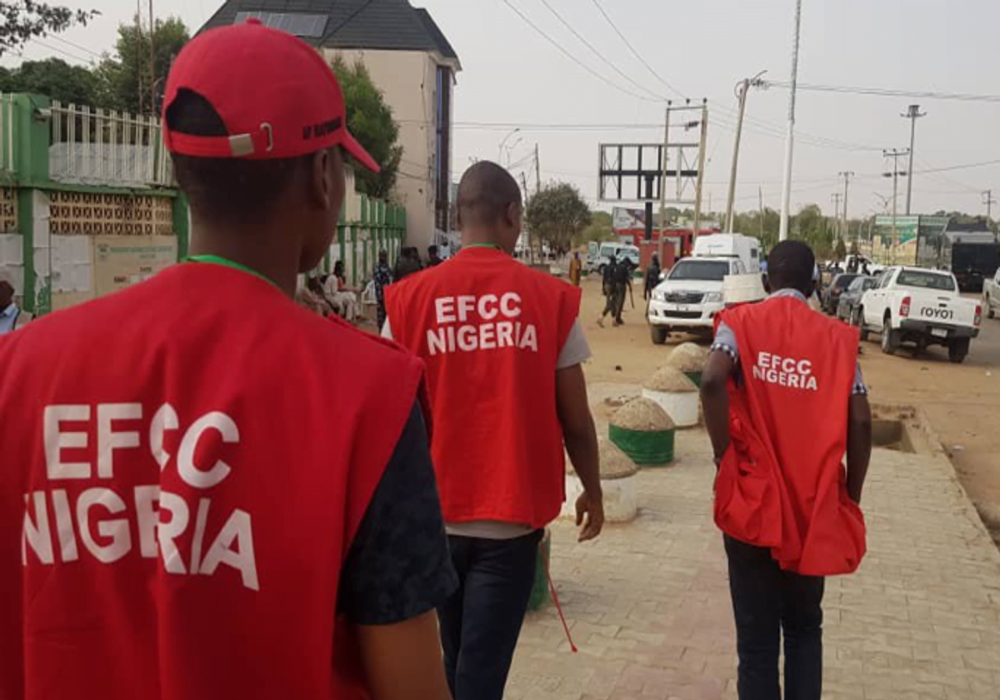Maritime
Capacity Development: NIMASA Reviews Sponsorship Of Cadets Training
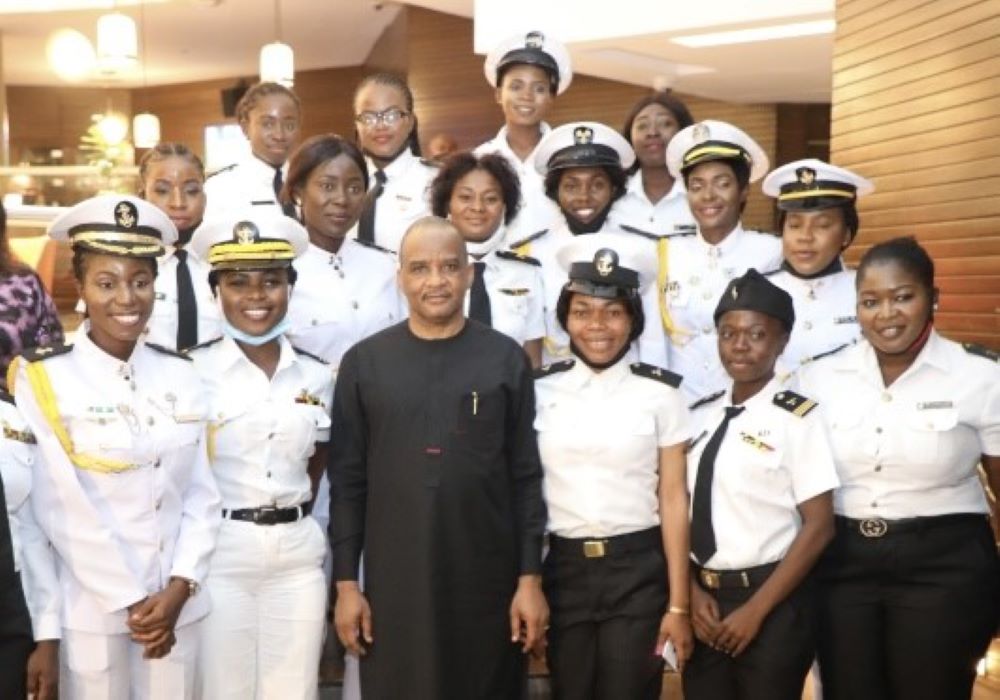
By John Mommoh
The Nigerian Maritime Administration and Safety Agency, NIMASA, is currently reviewing the cost of direct sponsorship of Nigerian cadets undergoing foreign training under the Nigerian Seafarers Development Programme (NSDP).
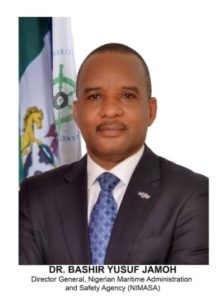 The Director General of NIMASA Dr Bashir Jamoh noted that the review of ongoing sponsorship costs has become necessary due to the global inflationary trends which are very pronounced in the Philippines, India and some other countries where Nigerian cadets are undergoing Certificate of Competency (CoC) Examination training under the NSDP programme. The sponsorship covers training leading to obtaining a Certificate of Competency, CoC.
The Director General of NIMASA Dr Bashir Jamoh noted that the review of ongoing sponsorship costs has become necessary due to the global inflationary trends which are very pronounced in the Philippines, India and some other countries where Nigerian cadets are undergoing Certificate of Competency (CoC) Examination training under the NSDP programme. The sponsorship covers training leading to obtaining a Certificate of Competency, CoC.
“We are not unmindful of the unforeseen global inflationary trend which has affected the cost of sustaining our cadets who are on sponsorship in some schools under the NSDP programme. Though NIMASA paid the tuition fee, examination fee and the original cost of feeding and accommodation in full, with allowance for extra funds as pocket money, however, it’s obvious that the cost of living has increased particularly in the Philippines due to the global inflation. The Agency is working closely with the Nigerian Embassy in the Philippines to address the challenges associated with the unexpected price increases.
We have put in place immediate and long-term arrangements to minimize the effect of inflation on their living standard during the programme. The Management of the Agency has approved an additional $2,000 dollars for each cadet, as extra funds due to inflation. This is a short-term measure to cushion the effect. I am sure the Nigerian Embassy will get in touch with the students immediately after the funds are ready to be disbursed. It is a well-coordinated arrangement through the embassy.
While working closely with the Nigerian Embassy in the Philippines to establish appropriate extra funds that may be required, NIMASA Management is deploying a team on fact-finding to interact with the students currently in the Philippines, officials of the Nigerian Embassy, the Maritime Industry Authority (MARINA), Philippines, some Licensure Examination Training & Review Centres (TRCs).
Read Also >> NIMASA, NITT Sign MoU To Strengthen Research On Maritime Security
146 cadets have acquired the Philippines sailing license through the NSDP programme with 134 currently undergoing the Programme and a further 170 being prepared to proceed to the Philippines for the examinations.”
The Agency has also made firm arrangements to ensure those cadets who have spent the stipulated 6 months approved for the CoC programme in the Philipines return home immediately. NIMASA urged the cadets to ensure they conclude their CoC examinations as scheduled.
NIMASA initiated the Nigerian Seafarers’ Development Programme (NSDP) in 2008 with the aim of addressing the dearth of Nigerian seafarers on ocean-going vessels and the need to meet the indigenous manning requirements of coastal and inland shipping (Cabotage regime).
The programme is designed to train Nigerian youth to become seafarers and Naval Architects in some of the best Maritime Training Institutions (MTIs) across the World.
So far the Agency has trained 2,241 cadets from the inception of the programme, with 841 graduates having obtained sailing licenses (Certificate of Competency) from Maritime Administrations of various countries. Out of this number, around 388 are now gainfully employed in maritime-related organizations, while others are in their final stages of the Programme.
Maritime
Nigeria Moves For Joint Maritime Task Force For Gulf Of Guinea
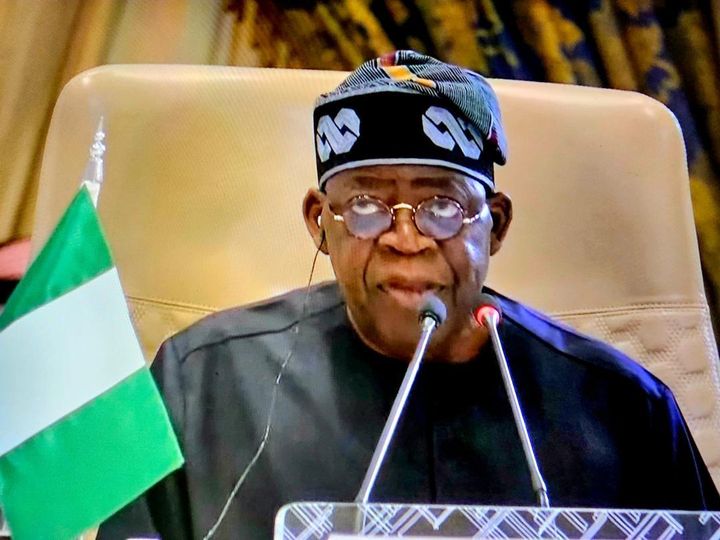
Nigeria’s President, Bola Ahmed Tinubu has tabled a motion for the establishment of a combined maritime task force to enhance security in the Gulf of Guinea before the Africa Union Peace and Security Council (AUPSC).
He made the call at the 38th Ordinary Session of the Assembly of the African Union (AU) Heads of State and Government in Addis Ababa, Ethiopia, on Sunday.
To give effect to the motion, President Tinubu expressed Nigeria’s readiness to host the task force’s headquarters in Lagos.
ALSO READ: Tinubu Calls For African Credit Rating Agency
President Tinubu conveyed Nigeria’s position as the AU considered the report on the AUPSC, focusing on peace and security in Africa, and the biennial report on the implementation of the Master Roadmap of Practical Steps to Silence the Guns in Africa (2023-2024).
The statement was delivered on behalf of President Tinubu by the Minister of Foreign Affairs, Ambassador Yusuf Tuggar.
“The time has come for the African Union Peace and Security Council to prioritise the creation of a Combined Maritime Task Force for the Gulf of Guinea.
“I wish to announce that Nigeria would like to host the headquarters of the task force in Lagos,” he said.
Nigeria’s recommendation of a maritime task force comes on the same day that it signed an agreement with the AU to provide Strategic Sea Lift Services for AU peace support operations, natural disaster support, humanitarian actions, and personnel movement.
It was gathered that Nigeria’s defence minister, Badaru Abubakar, signed the agreement.
Under the agreement, the Nigerian Navy will provide a vessel for the operations on a cost-recovery basis.
Nigeria’s Attorney-General and Justice Minister, Prince Lateef Fagbemi, Minister of Foreign Affairs, Ambassador Yusuf Tuggar, Naval Chief, Vice Admiral Emmanuel Ikechukwu Ogalla, and Director-General of the Nigerian Intelligence Agency, Ambassador Muhammed Muhammed, witnessed the agreement signing.
Ambassador Bankole Adeoye, the AU Commissioner for Political Affairs, Peace and Security, signed for the AU.
President Tinubu expressed satisfaction that the AUPSC had already adopted the outcomes of a high–level meeting, including the decision to upgrade the Nigerian National Counter-Terrorism Centre to a Regional Counter–Terrorism Centre.
He also appreciated the Peace and Security Council’s decision to renew the mandate of the Multinational Joint Taskforce, addressing the twin challenges of terrorism and violent extremism in the Lake Chad Region.
On Libya, the Nigerian leader expressed concern that the instability in the North African country has continued to worsen security challenges in the Sahel and called on the Assembly to back initiatives to restore law and order.
“The Sahel cannot enjoy peace as long as Libya does not,” he warned.
President Tinubu highlighted the severe insecurity affecting countries grappling with democratic transition, including Sudan, Burkina Faso, Mali, Niger, South Sudan, and Gabon.
“It would not be out of place to explore the possibility of extending the inherent benefits of UN Security Council Resolution 2719 to support AU Peace Support Operations,” he said.
In doing so, he added that the AU must try to prevent the increasing incursion of extra-continental forces, including private military companies, into African security matters.
President Tinubu welcomed the progress in operationalising the African Standby Force, reiterating Nigeria’s support.
He appealed to all AU member countries and delegations to show the necessary flexibility and allow the draft MoU on the operationalisation of the standby force to be adopted.
Maritime
Maritime Stakeholders Back Bill For Nigeria Coast Guard At Public Hearing
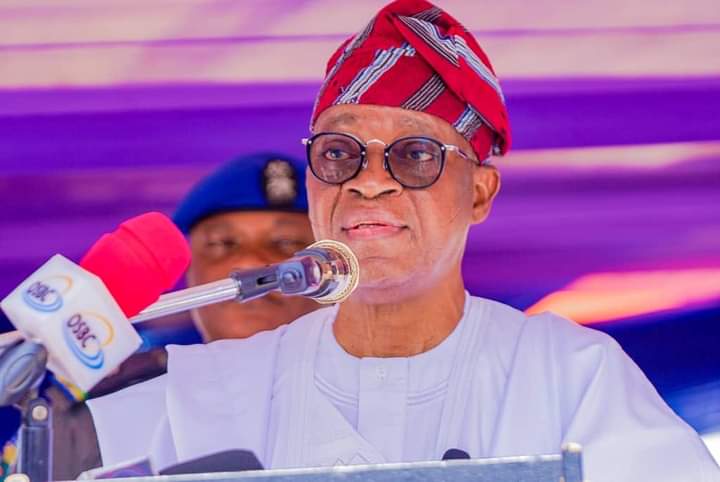
Stakeholders and experts in Nigeria’s maritime sector have expressed support for the Coast Guard Bill before the National Assembly, with many describing the proposed legislation as a boost to the federal government’s efforts in securing the maritime space.
At a public hearing convened by the Senate Committee on Marine Transport to discuss the bill for the establishment of the Nigeria Coast Guard (NCG), stakeholders presented varying views, with the majority supporting the creation of the NCG.
The majority of presentations voiced strong support for the establishment of the Coast Guard, with notable endorsements from prominent figures including Dr. Olisa Agbakoba, SAN; Dr. Ade Dosunmu, MON, former Director General of NIMASA; Mrs. Jean Anishere, SAN, representing the Nigeria Bar Association; and Rear Admiral Ekwerre U. Ekwerre (Rtd), former Flag Officer Commanding the Training Command of the Nigerian Navy.
ALSO READ: Like America, Like Ghana: Opposition Defeats Ruling Party In Presidential Election
Dr. Olisa Agbakoba described the bill as timely but emphasized the need for professional input to address certain concerns within the draft. He expressed his willingness to assist in this process. Dr. Ade Dosunmu offered full support for the bill, suggesting that the Nigerian Navy should focus on blue-water operations and national defense against external threats, while the Coast Guard should address maritime crimes and incidents along Nigeria’s extensive 855-kilometer coastline using more adaptable resources. He referenced successful maritime nations such as India, Singapore, China, the United States, Japan, Egypt, Morocco, and the United Arab Emirates, all of which have well-defined roles for both the Navy and Coast Guard.
However, Dr. Dosunmu cautioned against assigning functions such as hydrography and oceanographic research to the Coast Guard, as these responsibilities are already managed by other agencies, and incorporating them could divert focus from the Coast Guard’s primary mission.
Jean Anishere, SAN, articulated her support for the bill while highlighting certain ambiguities that must be resolved before it can be enacted. She pointed out specific provisions in the bill that require clarification and further refinement.
Retired Rear Admiral Ekwerre U. Ekwerre addressed concerns raised by the Nigerian Navy and advocated that the Navy should concentrate on defense, showcasing military strength, and conducting diplomatic operations within territorial waters and the Exclusive Economic Zone (EEZ). He asserted that the Coast Guard should be responsible for enforcing maritime laws in the nation’s inland waters.
In summary, while the majority of stakeholders endorsed the establishment of the Nigeria Coast Guard, they also called for careful consideration of the bill’s provisions to ensure clarity and effectiveness in its implementation.
Maritime
How Innovative Financing Would Aid Africa’s Maritime Sector – NIMASA DG
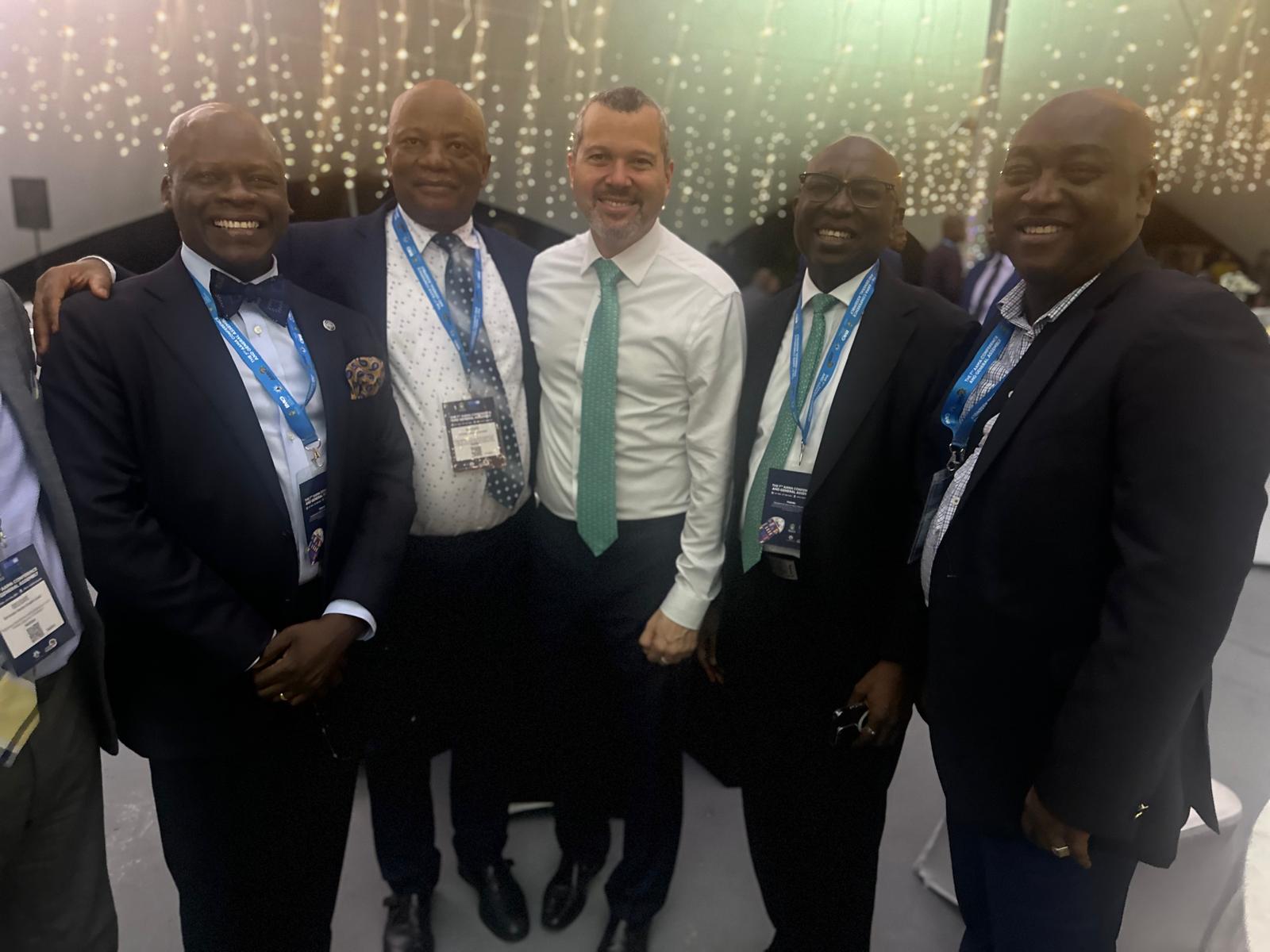
Innovative financing models have been identified as the vital catalyst for achieving sustainable development in the African Maritime industry.
The Director General of the Nigerian Maritime Administration and Safety Agency (NIMASA), Dr. Dayo Mobereola, made the declaration at the 7th Association of African Maritime Administrations (AAMA) conference in Dar es Salaam, Tanzania.
He assured attendees of Nigeria’s commitment to advancing a future where Africa’s maritime sector thrives sustainably.
In his words, “Nigeria is committed to collaborating on technology and innovation to enhance safety, security, decarbonization, and the marine environment for a sustainable future.”
According to him, the conference presents a pivotal opportunity to address our shared challenges, particularly those related to sustainable energy, regional security, and economic growth.
ALSO READ: Tinubu, Ramphosa Co-Chair Bi-National Commission’s 11th Session
“We are here to advocate for innovative financing models and international support that will facilitate sustainable growth. As Nigeria pursues infrastructure development and digital transformation within our maritime sector, we call on our regional and international partners to support these efforts through technical and financial backing.
“Our priorities at the AAMA conference include exploring collaborative avenues to enhance maritime safety and security. By reinforcing our adherence to frameworks like the Djibouti and Yaoundé Codes of Conduct, we aim to solidify Nigeria’s role in combating piracy and maritime crime across West Africa,” he stated.
The AAMA was established to lay a firm foundation for regular consultations, enabling African maritime administrations to build joint positions on issues of common concern in the maritime sector.
When Nigeria hosted the 3rd AAMA conference in 2017, a master plan was developed outlining the measures necessary to advance the maritime agenda as envisioned in the African Maritime Transport Charter. The Association has also created a platform to strengthen cooperation at the regional, continental, and international levels, harmonizing policies and goals essential for the growth of the African maritime sector.

